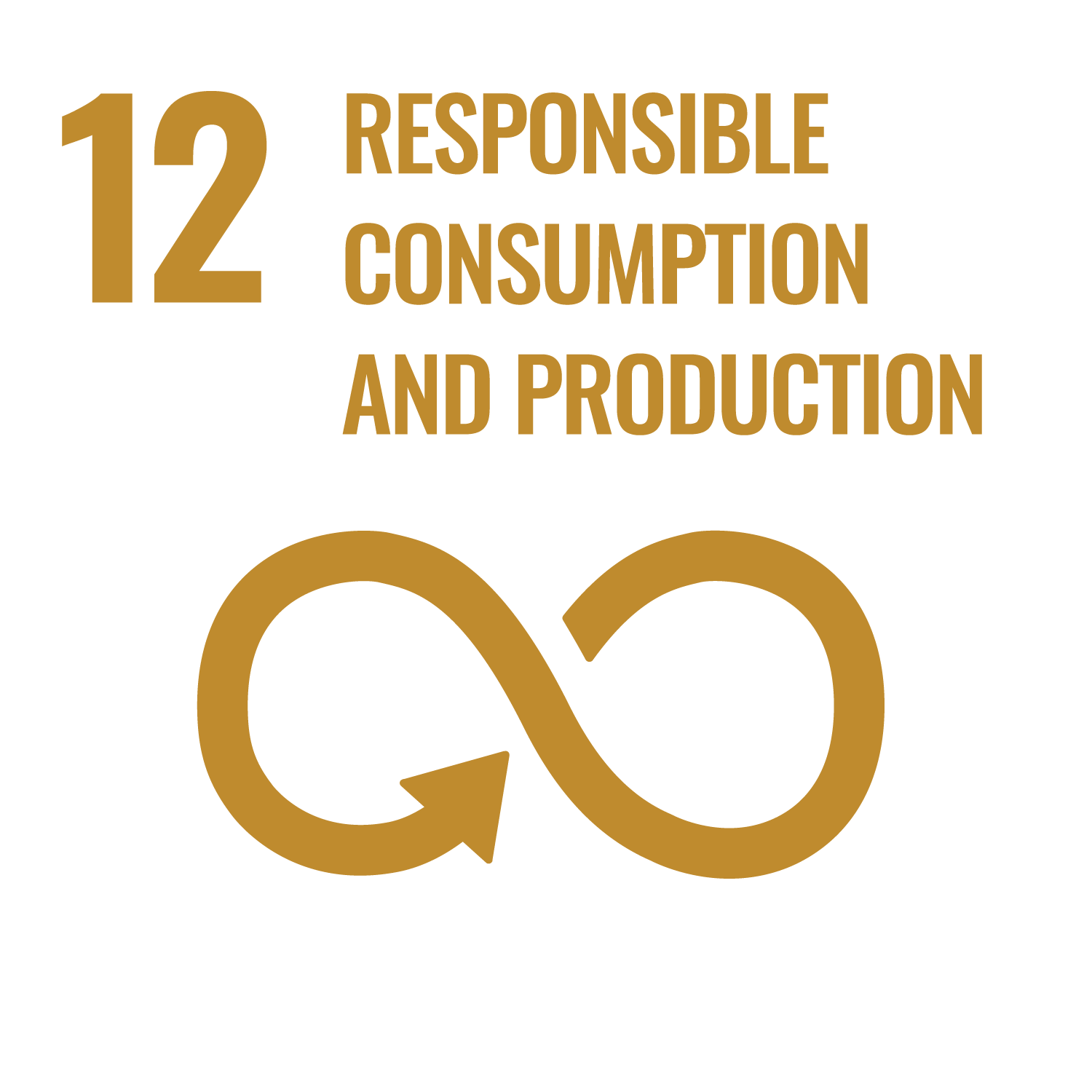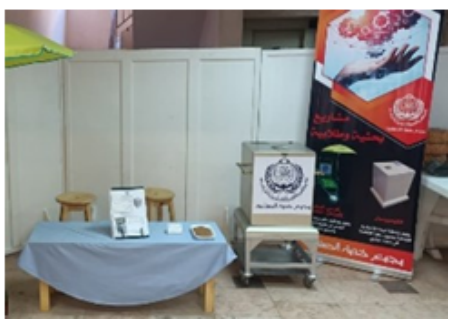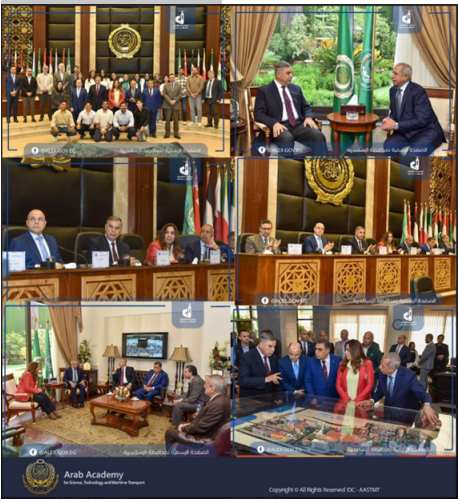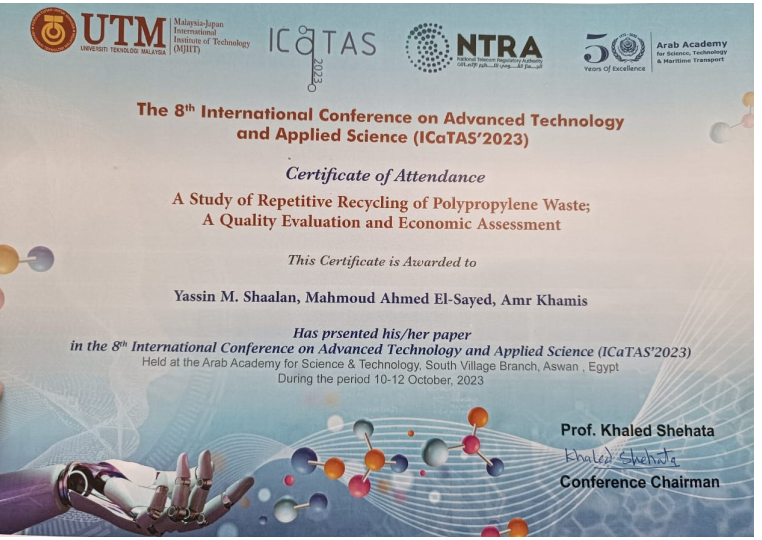 Goal 12. Responsible Consumption and Production
Goal 12. Responsible Consumption and Production
12.3.1 Waste tracking
2023-2024
As a form of the AASTMT's commitment to reducing the waste problem and reducing the proportion of waste that is sent to landfills. AASTMT is seeking to reduce the amount of waste generated in 2019 when it started to use recyclable materials at different levels and phases.
AASTMT measures the amount of waste generated in the university environment. Around 4.3 mT of waste in 2023-2024. Waste is a combination of organic and inorganic waste. AASTMT is meant to recycle 3.78 mT of the waste generated. The amount of waste sent to landfills is 0.5 mT mainly hazardous medical waste from clinics and faculties.
Zero-Waste Campus by the Year 2049 Is Our Main Goal
Our goal is to attain Zero-waste Campus status by 2049, while concurrently reducing our total trash generation by 15% prior to 2030. To comprehensively address campus waste, we must pursue novel solutions and forge new alliances across all dimensions.

Here are the details of a project funded by the AASTMT, a Video for the Campus Smart recycling system to turn Food organic waste and recyclables into economic value products. and https://aast.edu/openfiles/opencmsfiles/pdf_retreive_cms_open.php?disp_unit=1211/2068_proposal%20(1).pdf
AASTMT Entrepreneurship Center Showcases Spin-off Portfolio Driving Innovation in Egypt
The Arab Academy for Science, Technology and Maritime Transport (AASTMT) highlights its Entrepreneurship Center’s spin-off ventures—companies founded to translate university research into market solutions—such as HELFEX Robotics, CARBOCYCLE, and RE Nile, which focus on rehabilitation robotics, clean-energy agriculture, waste tracking and smart farming respectively.

AASTMT Entrepreneurship Spin-offs Portfolio
AASTMT Leads Workshop on Plastic Waste and EPR Policy
The Arab Academy for Science, Technology and Maritime Transport (AASTMT) organized a workshop on waste management in cooperation with Alexandria Governorate and Nahdet Misr Company and the German Retech Foundation, under the auspices of the Ministry of Environment and the Waste Management Regulatory Agency. The workshop activities were held on Tuesday 27- 8- 2024, at AASTMT AbuKir Campus, in the presence of H.E. Prof. Dr. Ismail Abdel Ghafar Ismail - AASTMT President, and the participation of H.E Dr. Yasmine Fouad - Minister of Environment via remote communication technology. The workshop was in the presence of H.E. Dr. Manal Awad - Minister of Local Development, H.E. Lieutenant General Ahmed Khaled Tawfik - Governor of Alexandria, H.E. Major General Alaa Abdel Moaty - Governor of Kafr El Sheikh, H.E. Major General Tarek Zaqzouq - Governor of Dakahlia, and Dr. Abdullah Nassour - Director of the Tomali Project at the University of Rostock in Germany and President of the German Reach Group Association, in addition to a group of representatives of ministries and experts in various fields. The workshop was held to raise the awareness of the potential and problems associated with waste management, as well as the significance of sustainable waste management for resource productivity and environmental preservation. The program covered contemporary waste management concerns as well as best practices in waste management, such as trash reduction, recycling, reuse, and proper disposal.

AASTMT Leads Workshop on Plastic Waste and EPR Policy
AASTMT Showcases Research on Polypropylene Waste Recycling at ICaTAS 2023 Conference in Aswan
At the 8th International Conference on Advanced Technology and Applied Science (ICaTAS 2023), held at the Arab Academy for Science, Technology and Maritime Transport (AASTMT) – Aswan Campus, Engineer Yassin Shaalan represented the AASTMT Industrial Service Complex in presenting a research paper titled “A Study of Repetitive Recycling of Polypropylene Waste: A Quality Evaluation and Economic Assessment.” The study, co-authored by Engineer Amr Khamis and Prof. Mahmoud Ahmed El-Sayed, was conducted under Research Grant No. 2068, titled “Campus Smart Recycling System to Turn Food Organic Wastes and Recyclables into Economic Value Products.” Funded by AASTMT with a total value of EGP 350,000, the project was implemented by the Research and Development Department between 2021 and 2023, reflecting AASTMT’s strong commitment to promoting sustainable research and practical innovation in waste recycling and circular economy applications.

2022-2023
As a form of the AASTMT's commitment to reducing the waste problem and reducing the proportion of waste that is sent to landfills. AASTMT is seeking to reduce the amount of waste generated in 2019 when it started to use recyclable materials at different levels and phases.
AASTMT measures the amount of waste generated in the university environment. Around 7mT of waste in 2021-2022. Waste is a combination of organic and inorganic waste. AASTMT is meant to recycle 6mT of the waste generated. The amount of waste sent to landfills is 1mT mainly hazardous medical waste from clinics and faculties.
Zero-Waste Campus by the Year 2049 Is Our Main Goal
Our goal is to attain Zero-waste Campus status by 2049, while concurrently reducing our total trash generation by 15% prior to 2030. To comprehensively address campus waste, we must pursue novel solutions and forge new alliances across all dimensions.
Here are the details of a project funded by the AASTMT, a Video for the Campus Smart recycling system to turn Food organic waste and recyclables into economic value products. and https://aast.edu/openfiles/opencmsfiles/pdf_retreive_cms_open.php?disp_unit=1211/2068_proposal%20(1).pdf
Turning Waste into Sustainable Solutions: AASTMT’s Focus on Vermicomposting
Part of its continuous dedication to sustainable waste management and recycling techniques, the Arab Academy for Science, Technology, and Maritime Transport (AASTMT) is aggressively investigating vermicomposting. By improving soil quality, increasing drainage, and lowering soil erosion, vermicomposting—a green method—transforms organic waste into nutrient-rich compost so supporting sustainable development. Apart from improving food preservation and crop yields, this natural composting technique is quite important in reducing methane and CO₂ emissions from organic waste. In line with sustainable development objectives, AASTMT keeps using vermicomposting over its campuses to generate fertilisers for agricultural areas, so supporting environmentally friendly waste disposal and environmentally conscious practices.
The Aquaculture Research Centre (ARC) of AASTMT on the main campus supervises this two-path recycling system. Waste is gathered and placed in earthworm composting pens in the first path, where it is transformed into vermicompost—then applied as organic fertiliser for landscaping. With some of the worms used in the fish culture operations of the ARC, the worms generated by this process also grow in number. The second route treats the waste to create soluble fertilisers and bio-gas. For several ARC operations, this bio-gas provides a substitute energy source that emphasises AASTMT's creative approach to waste management and sustainable energy. By means of continuous vermicomposting programs, AASTMT keeps encouraging environmentally friendly behaviours and transforms waste into valuable resources for landscaping and agricultural operations over its campuses.
Turning Waste into Sustainable Solutions
Arab Academy and Nahdet Misr Sign MoU for Sustainable Environmental Management and Training Collaboration
A Memorandum of Understanding was signed between Nahdet Misr Company and the Arab Academy for Science, Technology, and Maritime Transport (AASTMT).
Today, a joint Memorandum of Understanding was officially adopted between Nahdet Misr for Modern Environmental Services, a subsidiary of Arab Contractors, and the Arab Academy for Science, Technology, and Maritime Transport. Signed by: His Excellency, Mr. Hossam El-Din Imam (Chairman of the Board) and Prof. Dr. Alaa Abdel Bari (Vice President of the Academy).
The memorandum includes cooperation in the following areas:
- Waste management in the tourism sector to protect the marine environment in Alexandria Governorate.
- Collaboration in training programs agreed upon to enhance the efficiency of trainees.
- Conducting joint research in fields of mutual interest that serve the environment, cleanliness, and sustainable development.
- Exchange of information and consultations in areas of mutual interest, particularly as the Academy is an accredited Arab knowledge hub by the League of Arab States.
MoU for Sustainable Environmental Management and Training Collaboration
AAST Partners with Nahdet Misr in Pioneering Plastic Waste Collection Initiative for Alexandria’s Marine Conservation
The Ordinary General Assembly of Nahdet Misr for Modern Environmental Services, led by Chairman Hossam El-Din Imam, approved the 2022 financial statements and reported a revenue of EGP 886 million. The company increased its workforce to 7,200 employees, raising wages to EGP 295.4 million. Imam expressed gratitude to employees, auditors, and board members, and particularly thanked Ahmed El-Assar, Chairman of Arab Contractors, for ongoing support.
Improvements over the past year, including new equipment and vehicles, helped Alexandria become Egypt's cleanest governorate, leading to a 5-year contract with Alexandria Governorate for waste management and street cleaning services. Nahdet Misr also signed protocols with Titan Company for alternative fuel supply and with the Arab Academy for Science, Technology, and Maritime Transport (AASTMT) to establish a company focused on collecting plastic waste from Alexandria’s coastal areas. Imam emphasized the company's commitment to Egypt Vision 2030 and sustainable development goals, expanding services to new governorates and enhancing quality.
Pioneering Plastic Waste Collection Initiative for Alexandria’s Marine Conservation
Arab Academy Students Explore Environmental Training and Collaboration with Nahdet Misr for Modern Environmental Services
Nahdet Misr for Modern Environmental Services, a subsidiary of Arab Contractors, welcomed a delegation of students from the Arab Academy for Science and Technology at its headquarters in Moharram Bek. This visit was part of the memorandum of understanding regarding training to enhance the capabilities of human resources.
The student delegation was received by several company officials, including: Mr. Mohamed El-Saeed, Head of Environmental Treatment Sector and Medical Waste Management, Mr. Ahmed Tawfik, Head of Research and Development, Ms. Rita Elias, Office Manager of the Vice Chairman
The delegation visited the hazardous medical waste treatment center to learn about treatment methods and safe disposal practices in accordance with legal and environmental standards.
After the field tour, the delegation attended a meeting to learn about the company’s various activities and explore cooperation opportunities between the company and the Academy in the environmental sector.
Environmental Training and Collaboration with Nahdet Misr for Modern Environmental Services
Disposal Procedures at The College Of Pharmacy
The College Of Pharmacy At AASTMT Is Reinforcing Its Commitment To Environmental Safety With A Waste Disposal Initiative In Its Laboratories. Liquid Chemical Waste Is Collected In Designated Bottles Within Each Lab And Then Transferred To Larger Containers, While Broken Glass Is Stored In Separate Containers For Safe Disposal. All Waste Is Ultimately Handed Over To Nahdet Misr Company, A Certified Provider, To Ensure Environmentally Responsible Disposal. This Initiative Highlights AASTMT’s Dedication to Maintaining a Safe and Eco-Friendly Campus Environment
Disposal Procedures at The College Of Pharmacy
Medical and Biohazardous Waste Disposal Program
The AASTMT waste management process is designed to ensure the safe and environmentally responsible handling of hazardous waste from its point of generation in labs and clinics to its final disposal. Beginning with careful waste segregation, each type of hazardous material—whether chemical, biological, or medical—is collected in specially labeled containers to prevent cross-contamination and facilitate correct disposal procedures. For biological waste, an initial sterilization step via autoclaving neutralizes pathogens, reducing any health risks. The waste is then securely stored and periodically handed over to Nahdet Misr under the supervision of trained staff members to verify compliance with safety protocols. This carefully monitored end-to-end process, not only protects AASTMT’s campus community but also aligns with best practices in environmental stewardship by ensuring hazardous waste is handled, transported, and disposed of in a sustainable and regulated manner.
2022-2023
As a form of the AASTMT's commitment to reducing the waste problem and reducing the proportion of waste that is sent to landfills. AASTMT is seeking to reduce the amount of waste generated from 2019 when it started to use recyclable materials at different levels and phases.
AASTMT measures the amount of waste generated in the university environment. Around 7mT of waste in 2021-2022. The waste is a combination of organic and inorganic waste. AASTMT is meant to recycle 6mT of the waste generated. The amount of waste sent to landfills is 1mT mainly hazardous medical waste from clinics and faculties.
Zero-Waste Campus by the Year 2049 Is Our Main Goal
Our objective is to achieve Zero-waste Campus status by the year 2049, while simultaneously decreasing our total waste output by 15% before 2030. To effectively tackle all aspects of campus waste, we must seek innovative solutions and establish new collaborations, encompassing everything.
Here are the details of a project funded by the AASTMT project for the Campus Smart recycling system to turn Food organic waste and recyclables into economic value products. And here is the demonstration Video for the Campus Smart recycling system to turn Food organic waste and recyclables into economic value products.



